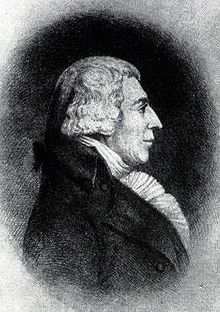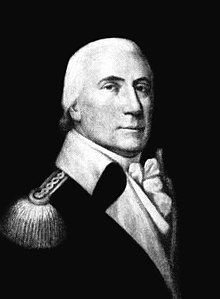North Carolina General Assembly of 1779 Three sessions of the general assembly of North Carolina held in 1779-1780
The North Carolina General Assembly of 1779Smithfield from May 3 to May 15, 1779; the second session in Halifax , from October 18 to November 10, 1779; the third and final session in New Bern , from January to February, 1780.[ 1] [ 2] [ 3] [ 4]
Each of the 50 North Carolina counties was authorized by the North Carolina Constitution of 1776 to elect one Senator and two members of the House of Commons. In addition, six districts (also called boroughs) were authorized to elect one House member each. Richard Caswell was elected governor by the legislature.[ 5] [ 1] [ 2]
Legislation
For additional laws and minutes of the 1779 General Assembly, see Legislative Documents .[ 6]
Councilors of State
This General Assembly selected the following Councilors of State on May 3, 1779:[ 2]
Joseph Leech from Craven County
Robert Bignall from Edgecombe County
John Sampson[ note 2]
John Simpson from Pitt County
Thomas Respass, Senior from Beaufort County[ note 3]
Isaac Guion from Craven County
William Whitfield from Dobbs County
Waightstill Avery from Burke Count (selected on October 25, 1779)
Edward Starkey from Onslow County (selected on October 30, 1779)
House of Commons
Leadership of the House of Commons
Members of the House of Commons
Rep. Benjamin Williams Rep. Willie Jones Rep. Richard Dobbs Spaight Rep. William Hooper In 1779, the General Assembly abolished Bute County and Tryon County. They also created eleven new counties: Franklin, Gates, Jones, Lincoln, Montgomery, Randolph, Richmond, Rutherford, Sullivan, Warren, and Wayne Counties. Members of the House of Commons are listed below, along with the county they represented:[ 1] [ 2] [ 3]
Senate
Senate leadership
Members of the senate
Sen. Samuel Johnston Sen. Allen Jones Sen. James Kenan Sen. Alexander Martin Sen. Abner Nash Members of the senate and counties they represented included the following[ 1] [ 2] [ 4]
See also
Notes
^ Not all counties sent two representatives. Some sent none or one.
^ John Sampson declined to serve as councilor of state.
^ Thomas Respass declined to serve as councilor of state.
^ This Dobbs County seat was declared vacant on May 15, 1779.
^ William Caswell was elected to replace Jesse Cobb. He took office October 20, 1779.
^ Thomas Gray's seat was declared vacant on May 15, 1779.
^ Abrham Sheppard was elected to replace Thomas Gray. He took office on October 20, 1779.
^ Ethelred Exum died before the second session.
^ William Haywood was elected to replace Ethelred Exum and served during third session.
^ William Haywood died in November 1779. There was no replacement.
^ Green Hill was elected Halifax district treasurer. His seat was declared vacant on May 15.
^ John Norwood was elected to replace Green Hill on October 18, 1779.
^ Gates County was formed in 1779 from parts of Chowan, Hertford, and Perquimans counties.
^ Bryan Lewis died in November 1779.
^ Jones County was formed in 1779 from the southwestern part of Craven County.
^ Lincoln County was formed in 1779 from the eastern part of Tryon County.
^ Absolam Tatum was named county clerk of court. His seat was declared vacant on May 8, 1779.
^ John Arnold was elected to replace Absolam Tatum. He assumed office on October 15, 1779.
^ a b Richmond County was formed from Anson County in 1779.
^ a b Sullivan County was established in 1779 from a portion of Washington County.
^ a b Wayne County was established in 1779 from the western part of Dobbs County.
^ Richard Cogdell was elected treasurer for the New Bern district.
^ Richard Dobbs Spaight was elected to replace Richard Cogdell. He took office on October 18, 1779.
^ Although Solomon Perkins was elected, there is no evidence of service in the minutes.
^ Allen Jones was elected to the Continental Congress. He resigned as senator on October 25, 1779.
^ Samuel Lockhart was elected to replace Allen Jones. He served during the third session.
References
^ a b c d Connor, R.D.D. (1913). A Manual of North Carolina (PDF) . Raleigh: North Carolina Historical Commission. Retrieved April 27, 2019 . ^ a b c d e Wheeler, John H. (1874). The Legislative Manual and Political Register of the State of North Carolina . Retrieved April 9, 2019 . ^ a b Lewis, J.D. "North Carolina State House 1778" . The American Revolution in North Carolina . Retrieved April 17, 2019 . ^ a b Lewis, J.D. "North Carolina State Senators 1778" . The American Revolution in North Carolina . Retrieved April 17, 2019 . ^ Holloman, Charles R. 1979.Caswell, Richard. NCpedia.
^ Lewis, J.D. "Laws of North Carolina, 1784" (PDF) . Carolana . Retrieved November 10, 2019 . ^ "William Dry, III" . NCPedia . Retrieved October 4, 2019 .^ Powell, William S. (1991). "Thomas Owen" . Retrieved November 4, 2019 .
List of North Carolina state legislatures Senate President pro tempore of the Senate House of Commons Speakers of the House of Representatives (see Note)Other Conventions Provincial Congresses and Constitution North Carolina Provincial Congress (1774–1776:
1st ,
2nd ,
3rd ,
4th ,
5th ),
Constitution of North Carolina (1776,
1835 Convention , 1861 Convention, 1868 redraft, 1875 Convention, Constitution of 1971)
Notes: Prior to the Constitution of 1868: the lower house of the North Carolina Legislature was known as the House of Commons and the leader of the Senate was called the Speaker of the Senate.








